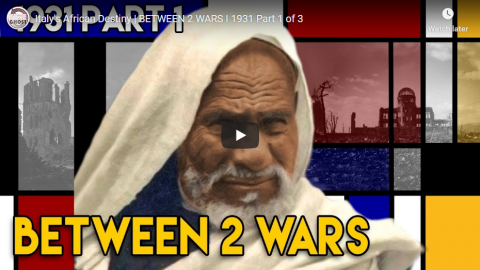Forgotten Weapons
Published 5 Feb 2020http://www.patreon.com/ForgottenWeapons
https://www.floatplane.com/channel/Fo…
Cool Forgotten Weapons merch! http://shop.bbtv.com/collections/forg…
In 1889, Emperor Menelik II ascended to power in Ethiopia, and would rule for 20 years, moving Ethiopia (aka Abyssinia) forward into the modern age. He brought railways, sewer systems, telegraph lines, and other modern amenities to the country, particularly the capital of Addis Ababa. In addition, Menelik II was a very capable logistician and military strategist, and decisively defeated an Italian colonial invasion at the Battle of Adwa in 1896. This victory was made possible by Ethiopian acquisition of modern arms of many types. Early support came from Orthodox Russia in the form of Berdan rifles, but other arms would flow into the country as well, including Gewehr 88 and Karabiner 88 rifles and carbines. These two are marked in Amharic as Menelik’s property, and are a part of what allowed Ethiopia to be the only major African nation not colonized by Europe.
Thanks to InterOrdnance for giving me access to these rifles to bring to you!
Contact:
Forgotten Weapons
6281 N. Oracle #36270
Tucson, AZ 85740
February 6, 2020
Rifles of Emperor Menelik II: Ethiopian Gewehr 88 and Karabiner 88
January 19, 2020
Mao Against Everyone – China at War and Civil War – WW2 – 073 – January 18, 1941
World War Two
Published 18 Jan 2020The Chinese Communists and Nationalists clash while they’re also both facing Japanese armies in the North. And although the Communists are not the obvious victor this week, the battle has bigger ramifications. Other action takes place in Cambodia and the Mediterranean.
Join us on Patreon: https://www.patreon.com/TimeGhostHistory
Or join The TimeGhost Army directly at: https://timeghost.tvFollow WW2 day by day on Instagram @World_war_two_realtime https://www.instagram.com/world_war_t…
Join our Discord Server: https://discord.gg/D6D2aYN.
Between 2 Wars: https://www.youtube.com/playlist?list…
Source list: http://bit.ly/WW2sourcesWritten and Hosted by: Indy Neidell
Produced and Directed by: Spartacus Olsson and Astrid Deinhard
Executive Producers: Bodo Rittenauer, Astrid Deinhard, Indy Neidell, Spartacus Olsson
Creative Producer: Joram Appel
Post-Production Director: Wieke Kapteijns
Research by: Indy Neidell
Edited by: Mikołaj Cackowski
Map animations: Eastory (https://www.youtube.com/c/eastory)Colorizations by:
– Dememorabilia – https://www.instagram.com/dememorabilia/
– Julius Jääskeläinen – https://www.facebook.com/JJcolorization/Sources:
Imperial War Museum (E872; E 6600)
Narodowe Archiwum CyfroweSoundtracks from Epidemic Sound:
Phoenix Tail – “At the Front”
Johannes Bornlof – “Death And Glory 2”
Johannes Bornlof – “Last Man Standing 3”
Yi Nantiro – “Watchman”
Johan Hynynen – “Dark Beginning”
Reynard Seidel – “Deflection”
Bonnie Grace – “Imperious”Archive by Screenocean/Reuters https://www.screenocean.com.
A TimeGhost chronological documentary produced by OnLion Entertainment GmbH.
January 10, 2020
One more Scramble in Africa – The Second Italo-Abyssinian War | BETWEEN 2 WARS I 1935 Part 4 of 4
TimeGhost History
Published 9 Jan 2020After European Empires were done scrambling for Africa, not much of the African continent was left to be ruled by its native people, or to be colonised for other colony-hungry European powers. However, the Kingdom of Abyssinia is one of the countries that made it through the scramble alive. That is, until Benito Mussolini shifts the Italian focus to East-Africa once more.
Join us on Patreon: https://www.patreon.com/TimeGhostHistory
Hosted by: Indy Neidell
Written by: Joram Appel, Spartacus Olsson and Naman Habtom
Directed by: Spartacus Olsson and Astrid Deinhard
Executive Producers: Bodo Rittenauer, Astrid Deinhard, Indy Neidell, Spartacus Olsson
Creative Producer: Joram Appel
Post-Production Director: Wieke Kapteijns
Research by: Naman Habtom
Edited by: Daniel Weiss
Sound design: Marek KaminskiSources:
Diploma by Alena from the Noun Project
Teacher by b farias from the Noun Project
guns by Cards Against Humanity from the Noun Project
Curved path by Allie Tate from the Noun Project
Labor Day by H Alberto Gongora from the Noun Project
train tracks by Prasad from the Noun ProjectColorizations by:
– Dememorabilia – https://www.instagram.com/dememorabilia/
– Julius Jääskeläinen – https://www.facebook.com/JJcolorization/A TimeGhost chronological documentary produced by OnLion Entertainment GmbH.
December 22, 2019
October 12, 2019
To the amazement of the chattering classes, Greta didn’t win the Nobel
Teen apocalypse prophet Greta Thunberg not only had her childhood stolen from her, now they’ve stolen her Nobel Prize:

Greta Thunberg at the EU Parliament, 16 April, 2019.
European Parliament photo via Wikimedia Commons.
It seems like Ethiopian Prime Minister Abiy Ahmed Ali stole even more of Greta Thunberg’s childhood by winning this year’s Nobel Peace Prize, beating the 16-year old Swedish Apocalyptic who seemed to have been the sentimental favourite of the international chattering classes (and the betting site Ladbrokes) for her figureheading of Climate Strikes and her recent appearance at the [United Nations] where she shouted at the adults for killing the planet. Ali was awarded the prize for ending the twenty-year conflict with the neighbouring Eritrea (once a part of Ethiopia) and the general moves to liberalise what has been a rather unappealing regime. In other words, Prime Minister Ali got his Peace Prize for actually bringing peace. Radical, eh?
Interestingly, Ali has not only done more for peace than Thunberg (it’s perhaps not a great claim to fame to have beaten a 16-year old girl, but hey, her cheerleaders in the media and elsewhere have turned her into a cross between a saint and a savant); he has also done far more for the environment. While Thunberg and millions of others wagged school and work and sat on their asses to save the Earth, Ali and millions of his compatriots got off theirs to do something quite spectacular recently:
Ethiopians planted more than 350,000,000 trees* in just 12 hours on Monday [29 July], the country’s minister of innovation and technology announced on Twitter. The mass-tree planting not only helps the environment, it sets a world record, the Associated Press reported.
Prime Minister Abiy Ahmed created the initiative to help restore Ethiopia’s landscape, which experts say is being eroded by deforestation and climate change, the AP reported.
The country’s goal was to plant 200 million trees in one day. But Getahun Mekuria, Ethiopia’s Minister of Innovation and Technology, later announced that 353,633,660 trees were planted.
Ethiopia has a larger goal of planting 4 billion trees between May and October 2019. So far, more than 2.6 billion trees have been planted in almost all parts of the country, the AP reported.
Planting trees is one of the most effective ways of removing CO2 from the atmosphere, which the trees (and all other plants) do through the process of photosynthesis as they grow. In fact, half the weight of a tree is carbon. Statistics vary between countries (and climates, soil conditions, etc), but a hectare of wood in the United States has some 118 tons of carbon, while in Europe the figure is 177 tons (density of trees can also, of course, vary widely but the plantation average is 1000-2500 per hectare). By the way, one tonne of carbon accounts for 3.67 tonnes of carbon dioxide, with oxygen being released back into the atmosphere.
August 24, 2019
Italy’s African Destiny | BETWEEN 2 WARS I 1931 Part 1 of 3
TimeGhost History
Published on 23 Aug 2019When Mussolini wants to solidify Italy’s North African colonies, he faces massive opposition by one man: Omar Mukhtar, the Lion of the Desert.
Join us on Patreon: https://www.patreon.com/TimeGhostHistory
Subscribe to our World War Two series: https://www.youtube.com/c/worldwartwo…
Hosted by: Indy Neidell
Written by: Spartacus Olsson
Directed by: Spartacus Olsson and Astrid Deinhard
Executive Producers: Bodo Rittenauer, Astrid Deinhard, Indy Neidell, Spartacus Olsson
Creative Producer: Joram Appel
Post-Production Director: Wieke Kapteijns
Research by: Naman Habtom
Edited by: Daniel Weiss
Sound design: Iryna DulkaArchive by Reuters/Screenocean http://screenocean.com
Sources:
Online:
https://www.politico.com/blogs/ben-sm…
Muslim Fascist Party and Youth Wing
http://countrystudies.us/libya/21.htm (Library of Congress)
https://www.nam.ac.uk/explore/senussi…
https://awayfromthewesternfront.org/c…
https://www.brookings.edu/blog/order-…
https://trove.nla.gov.au/newspaper/ar…Journal Articles:
Arielli, Nir. “Italian Involvement in the Arab Revolt in Palestine, 1936-1939.” British Journal of Middle Eastern Studies, vol. 35, no. 2, 2008, pp. 187–204. JSTOR, www.jstor.org/stable/20455584.Bussotti, L. (2016) “A History of Italian Citizenship Laws during the Era of the Monarchy (1861-1946)”. Advances in Historical Studies, 5, 143-167. doi: 10.4236/ahs.2016.54014.
Cooke, James J. “Destino Affricano De Popolo Italiano: Franco-Italian Controversy Over Tunisia, 1936-1940.” Proceedings of the Meeting of the French Colonial Historical Society, 13/14, 1990, pp. 203–216. JSTOR, www.jstor.org/stable/42952205.
Collins, Carole. “Imperialism and Revolution in Libya.” MERIP Reports, no. 27, 1974, pp. 3–22. JSTOR, www.jstor.org/stable/3011335.
KOPANSKI, ATAULLAH BOGDAN. “ISLAM IN ITALY AND IN ITS LIBYAN COLONY (720-1992).” Islamic Studies, vol. 32, no. 2, 1993, pp. 191–204. JSTOR, www.jstor.org/stable/20840121.
Pankhurst, Richard. “Education in Ethiopia during the Italian Fascist Occupation (1936-1941).” The International Journal of African Historical Studies, vol. 5, no. 3, 1972, pp. 361–396. JSTOR, www.jstor.org/stable/217091.
Pretelli, Matteo. “Education in the Italian colonies during the interwar period.” Modern Italy, Vol. 16, No. 3, August 2011, 275–293
Books:
Mark I. Choate: Emigrant nation: the making of Italy abroad, Harvard University Press, 2008, ISBN 0-674-02784-1, page 175.Peter Bandella The Eternal City: Roman Images in the Modern World, Chapter 7 – The University of North Carolina Press, 1987, ISBN 0-8078-6511-7
Ahmad Hassanein Bey The Lost Oases (read a Swedish translation by Ulla Ericson), American University of Cairo, reprinted 2006 (original 1925), ISBN 978-91-87771-41-5
A TimeGhost chronological documentary produced by OnLion Entertainment GmbH.
From the comments:
TimeGhost History
1 hour ago
As we approach one year of WW2 In Real Time we cannot express our gratitude for your support enough. It is the financial and spiritual involvement of the TimeGhost Army at https://www.patreon.com/TimeGhostHistory and https://timeghost.tv that has made it possible for us to do all of this – so thank you, once again!This episode comes out as our WW2 series is covering the first battles in the North African theatre. The Second World War there will have major impact on world events between 1940 and 1944. And this is the second episode covering the background to the conflict in North Africa and the Middle East. We will return to Africa again, but before that we will look at what is going on in Germany, Japan and the USSR in the early 1930s – as some of you might already guess or know, those are dramatic times in those places and it is in these years that the world takes its first concrete steps towards the conflict that erupts into world war in 1939.
June 2, 2017
Ethiopia goes offline
Cory Doctorow on Ethiopia’s decision to shut down access to the internet “to prevent exam cheating”:
The entire nation of Ethiopia — a corrupt, oligarchic state with the distinction of being “the world’s first turnkey surveillance state” where spy technology from the “free world” is used to spy on the whole country — just dropped off the internet.
The ruling clique says it turned off the country’s internet to prevent Ethiopian students from accessing final exam questions via Facebook groups run by the global Ethiopian diaspora, and indeed, last year’s exams were spoiled by early-circulated exam questions.
But Ethiopia routinely disappears from the world’s internet in response to dissent and protest, and these are never far from the surface in Ethiopia, so the exams might just be a convenient excuse.
It’s an interesting counter to the idea that even authoritarian regimes struggle to turn off their national internet systems, because these are vital to maintaining the elites’ business interests, as well as extractive industries like oil, or other industries like tourism. In Burma and Egypt, totalitarian regimes have wrestled with the question of when and whether to shut down the internet, often pulling the switch after it was too late (for them).
August 13, 2016
Harjit Sajjan: “Even using the terminology of peacekeeping is not valid at this time”
Our minister of national defence is on a tour of several African countries, looking at potential deployments for Canadian troops in troubled areas. A positive sign that the government is moving away from their long-standing infatuation with 70s-style “blue beret” peacekeeping missions is the message the minister communicated at the first stop of his tour, as reported in the Globe and Mail by Steven Chase:
Defence Minister Harjit Sajjan says what Canada will ask its soldiers to do in Africa can no longer be called peacekeeping because the term doesn’t reflect modern demands of stabilizing a conflict zone – something experts say could run the gamut from training other countries’ troops to counterterrorism.
Mr. Sajjan spoke from Ethiopia, the first stop in an eight-day fact-finding mission to Africa, as Ottawa tries to narrow where to deploy soldiers in what it promises will be a return to a major peacekeeping role for Canada.
The Defence Minister acknowledges the job in conflict-ravaged countries is potentially more dangerous these days and said he prefers the phrase “peace support operations” to describe the task Canada is preparing to embrace in one or more places in Africa.
“I think we can definitely say what we used to have as peacekeeping, before, is no longer. We don’t have two parties that have agreed on peace and there’s a peacekeeping force in between,” he told The Globe and Mail in an interview.
“Even using the terminology of peacekeeping is not valid at this time,” he said. “Those peacekeeping days, those realities, do not exist now and we need to understand the reality of today.”
Mr. Sajjan has been directed by Prime Minister Justin Trudeau to “renew Canada’s commitment to United Nations peace operations” – a campaign pledge made by the Liberals, who had accused the Harper government of turning its back on peacekeeping.
I strongly suspect that the Canadian Forces do not currently have the ability to engage in a significant role in Africa, given existing commitments to our NATO allies and the long list of equipment that needs to be replaced to maintain the Forces’ current capabilities. Aside from the big-ticket items for the RCN (replacing the current frigates, destroyers, and logistical support ships), the RCAF (the CF-18 is coming to the end of its service life so a new fighter aircraft is needed soon and we are still flying 1960s-era Sea King helicopters on our ships), there is a long list of boring, everyday equipment that also needs to be budgeted and ordered. The federal government is looking for economies in the defence budget, rather than looking to spend more. Foreign expeditions are very expensive, and Canadians are particularly sensitive to the risk of casualties in distant lands. Minister Sajjan may find a role that Canada can fill that would satisfy the PM’s desire to be seen to be doing more, yet does not run the risk of higher military spending and disproportional danger to our troops, but I don’t expect it to happen.
May 15, 2016
The Importance Of Oil – Ethiopian Empire I OUT OF THE TRENCHES
Published on 14 May 2016
Chair of Wisdom Time again. And this week Indy talks about the importance of oil and that big battle in the Ethiopian Empire you never heard of.
October 16, 2015
Fair Trade: Does It Help Poor Workers? (Everyday Economics 7/7)
Published on 8 Jul 2015
Elizabeth, an Everyday Economics viewer, asks: “How does the purchase of fair-trade goods affect wages in developing countries?”
Great question! The “fair trade” movement has become popular as a proposed way to increase living standards in developing countries. In this video, we look at whether fair trade does just that.
For a good to be considered “fair trade” it must meet various requirements developed by a handful of fair trade organizations. In the developing world, who is better positioned to meet these fair trade requirements — large producers in wealthier countries or small producers in poorer countries? To answer this question, we take a look at the the example of fair trade coffee produced in both Costa Rica and Ethiopia. How does fair trade affect wages and overall quality of life in those countries?
And, if fair trade isn’t the best way to improve living standards in developing countries, how else can we maximize employment options and well-being for poor workers? This question is at the core of an entire branch of economics — Development Economics. To learn more, check out MRU’s Development Economics course.
June 3, 2014
“Fairtrade [is] a Western vanity project that impoverishes those it’s meant to benefit”
Rossa Minogue on the image and reality of Fairtrade:
The world’s ethical shoppers are still reeling this week after a report revealed that Fairtrade programmes are of little benefit to those working on farms in the developing world.
The government-funded study published by SOAS, a part of the University of London, was conducted over a four-year period in Uganda and Ethiopia. It showed that labourers on farms that are part of Fairtrade programmes are usually paid less and are subject to worse working conditions than their peers on large commercial farms, and even other small farms that are not part of Fairtrade programmes. Professor Christopher Cramer, the study’s main author, said: ‘Fairtrade has not been an effective mechanism for improving the lives of wage workers, the poorest rural people.’
The study also found that the ‘social premium’ incorporated into the price of Fairtrade products, which is meant to be used to improve infrastructure in poor communities, is often misspent. In one instance, researchers found that modern toilets built with this premium were in fact for the use of senior farm managers only. The report also documented examples of health clinics and schools set up with social-premium funds that charged fees that were too high for the labourers they were intended to benefit.
Of course, nobody needed the clever people at SOAS to tell us all this. From its very inception, the concept of Fairtrade was rooted in maintaining low ‘sustainable’ horizons for the poor by those who consider people in Africa and other parts of the Third World to be intrinsically different to the rest of us. The movement did not originate with the poor farmers of the developing world, but with Western NGOs and their army of gap-year do-gooders intent on imposing their reactionary ‘small is beautiful’ values on an Africa desperate for change.
October 6, 2013
Nostalgic Doctor Who fans rejoice
According to a report in the Mirror, over 100 lost Doctor Who episodes have turned up in the most unlikely spot:
A group of dedicated Doctor Who fans tracked down at least 100 long-lost episodes of the show gathering dust more than 3,000 miles away in Ethiopia.
It was feared the BBC programmes from the 1960s — featuring the first two doctors William Hartnell and Patrick Troughton — had vanished for all time after the Beeb flogged off a load of old footage.
But after months of detective work the tapes have been unearthed at the Ethiopian Radio and Television Agency.
A television insider said: “It is a triumph and fans everywhere will be thrilled.
“This is a really big deal for the BBC and is set to make them millions from the sale of the DVDs.”
H/T to Tabatha Southey for the link.








